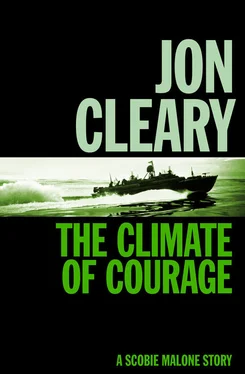“Does a woman ever understand a man?” It was the answer he had half-expected. “I don’t want to understand it, darling. If it’s the way you feel, then it’s all right with me.” He could feel her fingers digging into his back. “I just don’t want to lose you, that’s all.”
“I could be killed just as easily as a war correspondent,” he said, and knew at once that he was being cruel; he ran his hands gently over her. “Don’t let’s think about that part of it, darl. I’m not going to shove my neck out to prove I’m not a coward. I’m not searching for physical courage, although I don’t know that I have an abundance of that, either. It’s something else again, something I’d like to know I had, even if I never have to use it but once.”
“I said it a moment ago, Vern. If it’s what you want, it’s all right with me. I told you a long time ago, all I want is for you to be happy. And that includes every way, In the Army or out of it.”
There was no answer but to kiss her, to draw her to him and take the love that he sometimes felt was more than he deserved. Life had been a long climb over the rocks before he had met her, and disappointment had lost its bitterness for him. When he had met her he had expected something to go wrong with their love as a matter of course, but it never had. It had been a long time before the surprise had worn off that she loved him completely and forever.
She murmured sleepily as he held her to him, and the bed creaked as she moved closer to him. Outside in the street some youths laughed as they came up the hill from the picture theatre, and in the Hastings’ house next door he could hear the phone ringing peremptorily but in vain. A car went swishing by and a cat cried mournfully at the night; the phone next door stopped ringing and the youths had gone on, and abruptly there was silence.
The sounds I’ve missed, he thought, and almost instantly fell asleep with his face buried in his wife’s neck.
Standing there in the bar, amid the loud foreign-sounding babble of the hundreds of anonymous voices and beneath the thick blue smoke climbing lazily to the ceiling like diaphanous vines, he thought of the bazaars they had visited back in the Middle East and their superior comments on them, and he smiled to himself.
“What’s so funny, chum?” said Jack Savanna.
“Just thinking.”
“Well, quit thinking and start drinking. We’re waiting to order again.”
Just before the train had drawn in at Central Station and each of them had been whirled into the tight embracing circle of his own welcome home, several of the men had arranged to meet here in the Marble Bar this evening. In the confusion at the station, embracing wives or girl friends at the same time as they wished each other a good leave, saying hallo to relatives while they shouted See you in the Marble Bar! they had forgotten that the civilised drinking customs of the backward Middle East were now behind them. They were in civilised Australia again with its backward drinking customs, away from the Wogs and back with the wowsers, and one just didn’t join one’s friends for a drink at the Marble Bar or any other bar. Drinking in Sydney wasn’t as simple as that.
Vern had come in from the street, had looked about him, seen Jack Savanna waving to him above the heads of the crowd like a man calling for help in the middle of a riot, and had prepared for battle. He had taken a deep breath, raised his arms in front of him so that his elbows had stuck out like cow-catchers, and had ploughed his way through the sweating, yelling crush that is the Australian man in his leisure moments after a day’s work. Some day, perhaps, the blue laws that closed all hotels at six o’clock would be rescinded. In the meantime the wowsers, the narrow-minded of certain churches and societies, went smugly on in their belief that Sydney was being saved from further degradation by having limited drinking hours. Vern arrived at the bar bruised, dishevelled and feeling more degraded than if he had come by way of the sewer.
“With this sort of training,” he had said, “we can’t lose the war.”
The second round of drinks arrived, dumped in front of them by the cheerful, durable barmaid. She bad the hard brassy brightness of those women who would be out of a job if there were no men.
“Who’s your friend?” she said to Jack Savanna. “Another boy from your unit?”
“This is Mabel, Vern,” Jack said. Mabel smiled at Vern as if he were the only boy in the world, winked at him as if she knew all about him, then went away down the bar. Jack looked after her, then turned back. “Well, how’s the leave going? How are Dinah and the kids, chum?”
“Fine.” Vern sipped his beer, the good strong Australian stuff that made all the other beers taste like waste water. “What have you been doing?”
“Just taking things quietly,” said Jack. “Sort of easing myself back into Sydney so the impact won’t be too much for the population. But I’ll have to start stepping out soon if I want to get something out of my leave. Celibacy shouldn’t be one of the aims of such an occasion.”
Vern turned to the two men nearest him, Bluey Brown and Dad Mackenzie. “What sort of leave are you having? Has celibacy been one of your aims?”
“I’m too bloody old,” said Bluey Brown. “I’d like to know I had the choice of being celibate or not. I’m known as Old Impotence in our house.”
Staff-sergeant Brown had been a First World War man, and had only got into the current show by putting his age back and because he had been a member of the same club as the battalion’s first C.O. Vern knew that Bluey could have had a commission as the battalion quartermaster, but for his own reasons he had preferred to be nothing more than an N.C.O. He was forty-eight, cheerfully plump, his red hair was now only a suggestion, like rosy cirrus clouds round the beaming sun of his face, and he was the most popular man in the whole battalion despite the fact that he was the company quarter-master sergeant.
Dad Mackenzie grinned, the smile as cautious as everything else he did. “Things have changed since we went away. The chookies seem much easier.”
“Influence of the Yanks,” said Jack Savanna. “I don’t know that it is a bad thing.”
“You wouldn’t,” said Vern. “I can’t ever remember you supporting the morals of the community. You were always doing your best to bring about a lowering of them.” He had known Jack before the war, when the latter had worked for the Australian Broadcasting Commission: not much more than casually, but enough to know that Jack was something of a rake. “Easy chookies, as Dad calls them, were always your meat.”
“In this particular instance,” said Jack, “I am trying to be impersonal. I am looking at the picture from a distance, as it were. I have a great interest in the future of Australian womanhood.”
“He’s a nephew of Dorothy Dix,” Bluey Brown told Dad Mackenzie.
“Go on?” said Dad Mackenzie. “Legitimate or illegitimate?”
Jack hadn’t heard the interruptions. “I think a leavening of the Americans’ preoccupation with sex, their wonderfully uninhibited attitude towards it—at least while they’re abroad—may do something towards breaking down the broad, if not admitted, puritanical streak in our national make-up.”
“I haven’t detected any broad puritanical streak in you,” said Bluey. “Turn around and let’s have a look.”
“I have done my best to eradicate it,” said Jack.
“You’ve been eminently successful,” said Vern, then turned round to see Charlie Fogarty grinning at them. “Hallo, Charlie. What the hell’s that you’re drinking?”
“Shandy,” said Charlie. “Three parts lemonade, one part beer. It saves the barmaid embarrassment.”
Читать дальше












